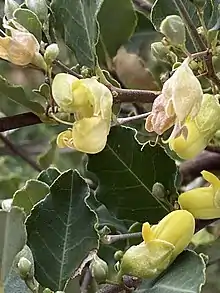Gastrolobium sericeum
Gastrolobium sericeum is a flowering plant in the family Fabaceae. It is endemic to the south-west of Western Australia. It is a prostrate, low shrub with pendulous yellow, green, red or nearly black pea-flowers from spring to summer.
| Gastrolobium sericeum | |
|---|---|
 | |
| Scientific classification | |
| Kingdom: | Plantae |
| Clade: | Tracheophytes |
| Clade: | Angiosperms |
| Clade: | Eudicots |
| Clade: | Rosids |
| Order: | Fabales |
| Family: | Fabaceae |
| Subfamily: | Faboideae |
| Genus: | Gastrolobium |
| Species: | G. sericeum |
| Binomial name | |
| Gastrolobium sericeum | |
| Synonyms | |
| |
Description
Gastrolobium sericeum is a low growing, dense prostrate or twining shrub to 1 m (3 ft 3 in) high. The branchlets more or less needle-shaped and smooth. The leaves are arranged alternately on the stem, elliptic to orb-shaped sometimes oval, 6–50 mm (0.24–1.97 in) long, 6–30 mm (0.24–1.18 in) wide, prominently veined, wavy, margins finely scalloped and rolled under, apex rounded to sharp or occasionally notched. The pendulous yellow, green, red or nearly black pea-flowers have yellowish or green markings, the standard petal 15 mm (0.59 in) long, the keel 12–16 mm (0.47–0.63 in) long and smooth. Flowering occurs from September to December and the fruit is a pod. It is not known whether this species shares the toxic properties of many other members of the genus Gastrolobium.[2][3]
Taxonomy
Gastrolobium sericeum was first formally described in 1864 by botanist James Edward Smith and the description published in Transactions of the Linnean Society of London . He gave it the name Chorizema sericeum Subsequently, it was placed in the genus Brachysema. Finally, in 1995, botanist Michael Crisp placed the species in the genus Gastrolobium along with a number of other Brachysema species.[4]
Distribution
This species is usually found along the edge of streams or swamps.[2]
References
- "Gastrolobium sericeum". Australian Plant Census. Retrieved 24 August 2021.
- Chandler, G. T.; M.D. Crisp; L.W. Cayzer & R.J. Bayer (2002). "Monograph of Gastrolobium (Fabaceae: Mirbelieae)" (PDF). Australian Systematic Botany. 15 (5): 619–739. doi:10.1071/SB01010.
- "Gastrolobium sericeum". FloraBase. Western Australian Government Department of Biodiversity, Conservation and Attractions.
- "Gastrolobium sericeum". APNI. Retrieved 24 August 2021.